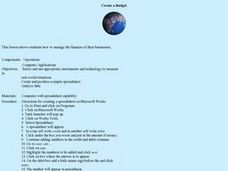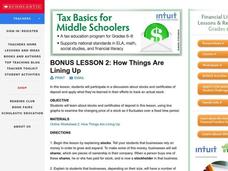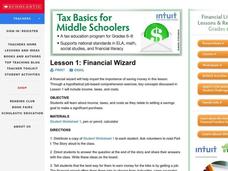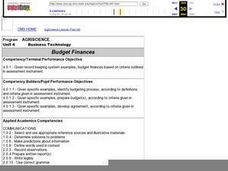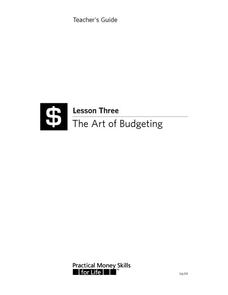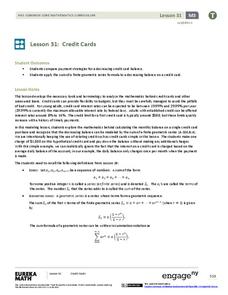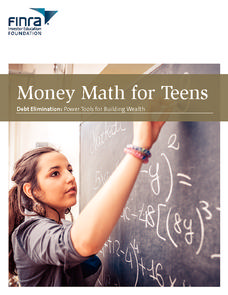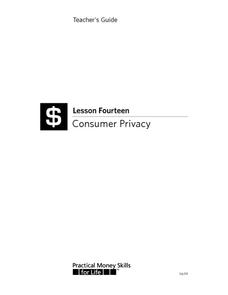Curated OER
Spend, Save, Invest or Donate (9-12)
Students explore the concept of personal finance. In this philanthropy instructional activity, students examine decisions they make about money as they discover the definitions of philanthropy, resources, scarcity, choice, benefits,...
Curated OER
Create a Budget
Students develop a budget spreadsheet to manage finances for their business. In this finance lesson, students use a spreadsheet program to create a budget with credit and debit columns. There are step-by-step directions for...
Federal Reserve Bank
Lesson 1: Katrina Strikes
Most families have an emergency kit in their home with flashlights, water, and extra food. But what happens to your money when disaster strikes? An economics lesson focused on the aftermath of Hurricane Katrina in 2005 demonstrates the...
Curated OER
Scoring a Financial Education
Students explore the concept of money management. In this money management lesson, students read an article about students taking a finance course in high school and college. Students discuss the importance of money management. Students...
Curated OER
Math and Money
Students explore financial literacy. In this middle school mathematics lesson, students investigate income, taxes, and costs of living. Students investigate banking and use straightforward computation to learn about savings,...
Curated OER
Math and Money
Students explore personal finance. For this middle school mathematics lesson, students investigate banking, income tax, and the cost of living. The lesson includes two bonus lessons on graphing their personal spending habits...
PricewaterhouseCoopers
Paying for College: Finding the Right Fit
Most want to attend college, but do they know where? How will they afford it? How do they apply? Learners discover the costs associated with college and the best way to budget and possibly apply for financial aid.
Federal Reserve Bank
Creating a Budget
Learning to create and maintain a budget is an important life skill. Guide individuals in the discovery of their spending habits and how to track them. They then use what they learned to create a budget and make decisions on where they...
Federal Reserve Bank
Your Credit Report
What is your credit score? How do you find it? Help your pupils answer these questions and more. They will access their free credit report and then analyze its meaning.
Federal Reserve Bank
Purchasing a Vehicle
Start your engines! Prevent negative car buying experiences by arming pupils with information. Prepare your young drivers to make informed decisions when they are ready to purchase a car. All aspects are considered from the type of car...
Visa
Smooth Sailing: Exploring Insurance and Estate Planning
While purchasing insurance and estate planning may seem like a rather irrelevant topic for high school students, introducing this concept now can help your learners develop a solid foundation of financial literacy that will...
Federal Reserve Bank
Insurance Inventory
Do you have enough insurance? Pupils may be surprised to learn how much their possessions are worth. This activity asks them to create an inclusive list and make a comparison to their insurance coverage. According to the statistics, most...
Federal Reserve Bank
Income Taxes
Most adults dread April 15 — tax day! Tax preparation can be intimidating even for adults. Build confidence by leading individuals through the process and then give them a scenario to practice. The exercise uses tax vocabulary to give...
Curated OER
How Much Will That House Cost?
What is a mortgage and how do you use it to pay for a house? Young financiers determine how much money is actually spent paying a mortgage payment on a home. They use their math skills to calculate monthly payments on a home given a 30...
Curated OER
The Class Trip
Mrs. Moore's class is trying to earn money for a trip to the science museum, but how much more do they need? Solve this problem with your own class as they develop their ability to model real-life situations algebraically. As an added...
Visa
The Danger of Debt: Avoiding Financial Pitfalls
How can our perspectives of borrowing and returning influence the way we view credit? Pupils explore the concept of debt, how it impacts our ability to obtain credit, and finally the ways in which we can work to alleviate debt.
Federal Reserve Bank
So How Much Are You Really Paying for that Loan?
Loans are rarely provided without a cost. Pupils evaluate the high cost of using a payday loan or payday advance through discussion and worksheets, and finally work in groups to develop short public service announcements...
Curated OER
Budget Finances
Learners role play the role of a recent graduate of high school living on their own. Using play money, they are given one month's salary and they discover they own their own house or apartment and owe money on a car loan. They develop...
Visa
The Art of Budgeting
Class members learn how to set up and maintain a personal budget through discussion, financial planning worksheets, and a brief PowerPoint presentation.
EngageNY
Credit Cards
Teach adolescents to use credit responsibly. The 32nd installment of a 35-part module covers how to calculate credit card payments using a geometric series. It teaches terminology and concepts necessary to understand credit card debt.
Money Math for Teens
Debt Elimination - Power Tools for Building Wealth
What does it mean to be wealthy? Your learners will consider how carrying debt affects budgeting, and learn about the debt snowball strategy and how is it used in the concept of eliminating debt in order to build wealth.
Visa
In Trouble
What are some of the financial risks associated with using credit? Pupils learn the warning signs of incurring financial hardship, and through PowerPoint presentations, worksheets, and discussion, discover the...
Visa
Consumer Privacy
The availability of personal financial information is of greater importance now than ever before. Your pupils will discuss how public and private records are accessed by various organizations, particularly considering direct mail, credit...
Visa
Buying a Home
What is the difference between buying and renting a home? Learners become more informed consumers and financially literate adults after developing foundational knowledge of the home-buying process.



